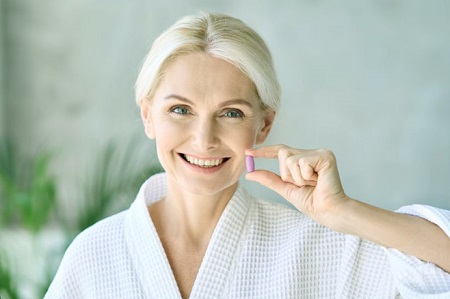Nikhil Prasad Fact checked by:Thailand Medical News Team Nov 05, 2024 1 year, 3 months, 2 weeks, 6 days, 5 hours ago
Medical News: As women transition into menopause, their bodies undergo significant changes, with oxidative stress becoming a major health concern. Increased oxidative stress can lead to damage in cells and contribute to aging-related diseases. This is particularly troubling for postmenopausal women, who face heightened risks for conditions like heart disease and diabetes. Recent research has explored the potential benefits of antioxidants like resveratrol and vitamin C to combat oxidative stress. A new study by researchers from the Instituto Nacional de Perinatología and Instituto Nacional de Medicina Genómica in Mexico City has shown that these two antioxidants, when combined, may help reduce markers of oxidative stress in postmenopausal women. This
Medical News report takes a closer look at the findings and what they could mean for women's health in later life.
 Resveratrol and Vitamin C Fight Oxidative Stress in Postmenopausal Women
Study Overview: Testing Antioxidants for Oxidative Stress Relief
Resveratrol and Vitamin C Fight Oxidative Stress in Postmenopausal Women
Study Overview: Testing Antioxidants for Oxidative Stress Relief
The research aimed to evaluate the effectiveness of resveratrol and vitamin C, alone and combined, in reducing oxidative stress in postmenopausal women with insulin resistance. Oxidative stress, caused by an imbalance of free radicals and antioxidants in the body, is a critical factor in the aging process, especially in postmenopausal women. The study enrolled 46 women, dividing them into three groups. Group A received only resveratrol, Group B took a combination of resveratrol and vitamin C, and Group C was given only vitamin C.
The study’s approach involved monitoring changes in specific oxidative stress markers, such as lipohydroperoxides (LPH), malondialdehyde (MDA), and protein carbonylation levels, over three months. By examining these indicators, researchers aimed to determine whether the antioxidants could effectively reduce the oxidative stress levels in these women. Importantly, the study highlights that while both antioxidants showed benefits, the combination of resveratrol and vitamin C delivered the most significant results.
Key Findings: How Antioxidants Fared in the Study
-Reduction in Lipohydroperoxides (LPH):
Lipohydroperoxides are a primary indicator of oxidative stress and lipid peroxidation, a process that can damage cell membranes. Among the three groups, Group B (resveratrol plus vitamin C) showed a significant 33% reduction in LPH levels. This result suggests that combining these antioxidants is more effective than using either resveratrol or vitamin C alone. The resveratrol-only group had a 25% reduction, while the vitamin C-only group reduced LPH by 15%.
-Decrease in Malondialdehyde (MDA):
MDA is another byproduct of oxidative stress, often associated with the breakdown of polyunsaturated fats. All three groups showed decreases in MDA levels, with the most notable reductions in the vitamin C group (38%) and the combined treatment group (32%). This reduction indicates that the antioxidants effectively decreased lipid damage, with vitamin C alone sh
owing a stronger effect in reducing MDA than resveratrol alone.
-Protein Carbonylation:
Oxidative damage to proteins is often measured by the presence of carbonyl groups, which increase with protein breakdown. The study found that the combined antioxidant group saw a significant 39% decrease in protein carbonylation, while both single-antioxidant groups achieved a 29% reduction. This suggests that the resveratrol and vitamin C combination may offer superior protection against oxidative protein damage compared to either antioxidant alone.
-Boost in Total Antioxidant Capacity (TAC):
Total antioxidant capacity (TAC) is a measure of the body’s ability to neutralize free radicals. Group B, the combination group, exhibited a 30% boost in TAC, whereas the vitamin C group saw a 28% increase. Resveratrol alone increased TAC by 11%. This improvement in antioxidant capacity reinforces the idea that combining these two antioxidants provides a stronger defense against oxidative stress than either one alone.
Why Resveratrol and Vitamin C Might Work Better Together
Resveratrol, a compound found in grapes and berries, is known for its anti-inflammatory and antioxidant properties. It activates various cellular processes that enhance antioxidant defense mechanisms in the body. Vitamin C, on the other hand, is an essential nutrient with powerful antioxidant effects, capable of neutralizing free radicals and regenerating other antioxidants. When used together, these two antioxidants may work in a complementary way, boosting each other’s effectiveness and providing a more robust defense against oxidative stress.
The study’s findings align with existing research on the health benefits of these antioxidants. Previous studies have shown that resveratrol can reduce oxidative stress in heart disease and diabetes, while vitamin C is widely recognized for its protective role in immune function and cell health.
Conclusions: Promising Results but More Research Needed
While the results of this study are promising, it is important to consider that this was a pilot study with a relatively small sample size. Although the combination of resveratrol and vitamin C appears to offer superior benefits in reducing oxidative stress markers, more extensive studies with larger populations are necessary to confirm these findings. Additionally, further research could help determine the ideal dosages and combination strategies for these antioxidants.
For now, this study provides encouraging evidence that resveratrol and vitamin C, particularly when used together, may be beneficial in managing oxidative stress and supporting better health in postmenopausal women. If these findings are replicated in larger studies, it could lead to new recommendations for dietary supplements aimed at reducing age-related oxidative damage.
The study findings were published in the peer-reviewed journal: Nutrients.
https://www.mdpi.com/2072-6643/16/21/3775
For the latest on Menopause, keep on logging on to Thailand
Medical News.
Read Also:
https://www.thailandmedical.news/news/crushed-flaxseed-a-natural-boost-for-heart-health-in-menopausal-women
https://www.thailandmedical.news/news/menopause-news-american-study-finds-that-low-fat-vegan-diet-with-soy-decreases-hot-flashes-by-95-percent
https://www.thailandmedical.news/articles/menopause
